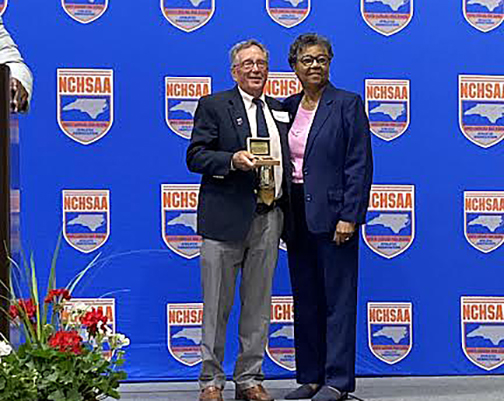Welcome!

Bill Croom is honored by the NCHSAA's Commissioner Que Tucker in Greensboro.
Making the right call
ASHEBORO — Being a high school football official can be a thankless position. No matter what you call, there are going to be argumentative and sometimes abusive people on the sidelines and in the stands.
Officials make a call to the best of their ability and move on. Asheboro’s Bill Croom has done just that: Make a call and move on … for nearly 50 years.
Croom, who will be entering his 50th season with the North State Football Officials Association this fall, received the ultimate honor last week as he was awarded the Golden Whistle Award by the NCHSAA during the organizations’ annual Awards Ceremony held at the Greensboro Coliseum.
It is the ultimate honor for an official in North Carolina.
Criteria for the Golden Whistle Award includes demonstrating leadership, performance, service and training for the betterment of officiating, possessing officiating abilities emulated by fellow officials, being regarded as a person of integrity and character, and a minimum of 10 years of experience as an active official.
“I had always heard of the award, but never thought I would be considered,” said Croom, who said Cecil Mock, who is the supervisor for officials in the state, called him about a month ago with the good news. “I was shocked. I was speechless.
“I was shocked but have felt blessed to have the health to officiate as long as I have. I have had great mentors and officials that have helped me get through ballgames and I hope I have helped them, too.”
Croom, 72, said he first became interested in officiating while playing for Asheboro High School. The 1969 AHS graduate said even while playing football, he spent time studying and talking with officials.
“I played high school football and was always interested in the rules,” Croom said. “Then in 1973, I was home from college and saw in The Courier-Tribune a notice that if anyone was interested in officiating to meet at this one location. I went to that meeting and the rest is history.”
There are many reasons Croom continues to return to the football field every Friday night.
“Everything changes,” he says. “There are no games with the same situations, they are all different. You're kept on your toes and it keeps me active and my brain working. I enjoy studying rules and keeping up with them every year. I got it in my blood.”
Throughout his career, Croom has seen both ends of the spectrum when it comes to sportsmanship in high school sports. While the negative part of officiating is often brought into the spotlight, there have been as many uplifting, inspiring moments on the field. Croom has dealt with both.
“Now, schools are required to make sure you have an escort after the game, but that wasn’t always the case,” Croom remembered. “One game, we were leaving through the stands and people were saying some really nasty things to us. Wishing bad things happened to us on the way home.”
And then there are the times that keep Croom coming back for more.
“I was officiating a game, an important game for the conference championship, I think, and it was really tight and during a timeout, a coach came up to me and said, ‘Isn’t this fun?’ That makes you feel good.
“There are some great coaches out there who respect the game, respect what we do and thank us,” Croom said. “I have had emails after a ballgame through our regional supervisor that say this crew did a great job.
“When you hear that every now and then, it makes it worthwhile.”
Croom, who is in his 17th year at Insurance Associates of the Triad, spent one year as a basketball referee, but didn’t like the “closeness” of the crowd.
The game itself has changed over the years, said Croom, who has officiated three state championship football games. With the players getting bigger, faster and stronger every year, safety has been a major concern.
“Safety has always been a concern, but now you have the concussion protocols and you have to keep up with all those changes. They are implemented for the safety of the players.”
Croom said he knows when it will be time to turn in his whistle. For now, he’s taking it one year at a time.
“I look every year and see how I feel,” Croom said. “I have some officials I am really close to and I told them if it ever gets to the point where I am hurting the game or hurting the crew, I am counting on them to tell me and then I will get out.”
That certainly seems like it’s still a long, long way away.
